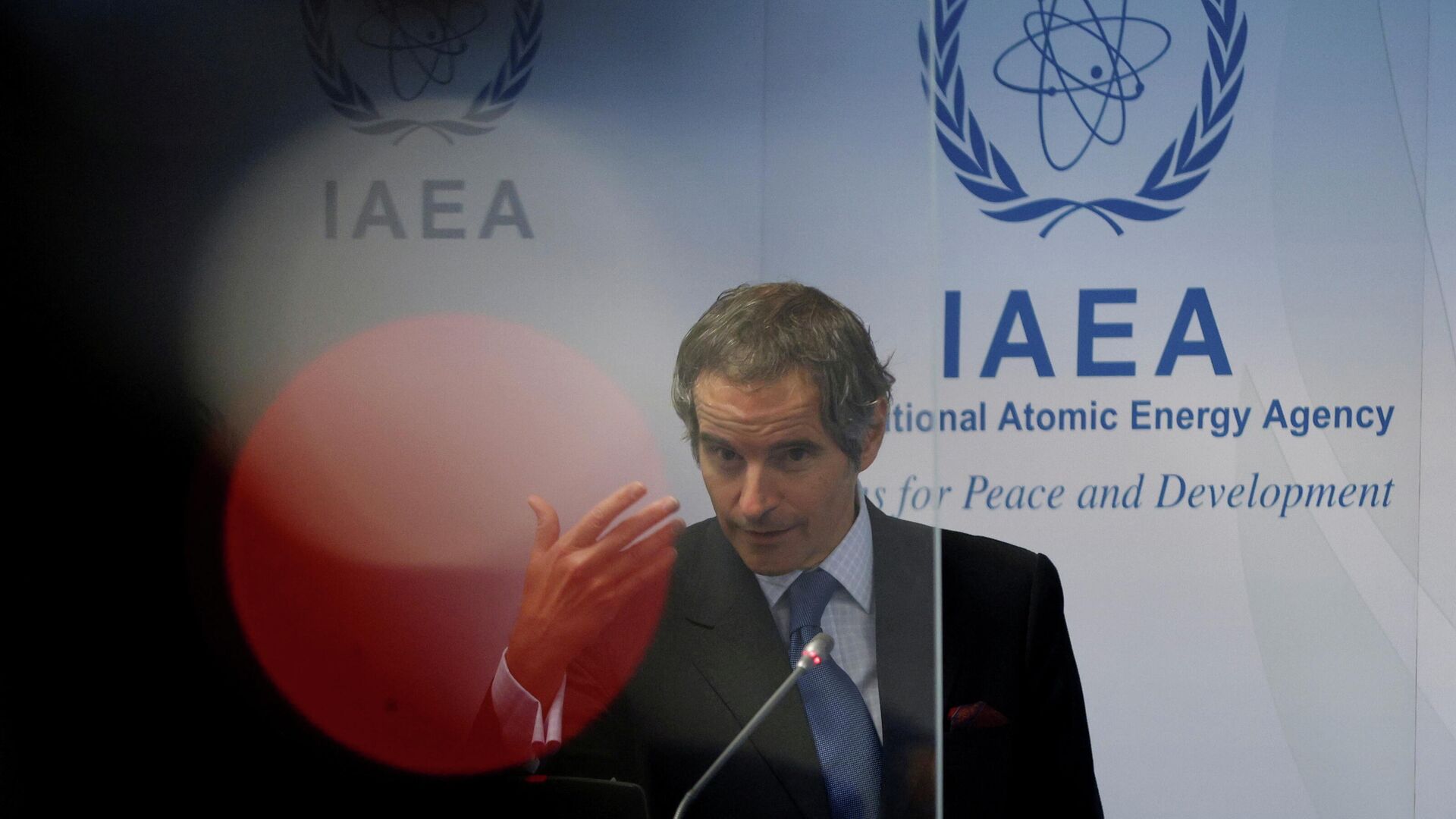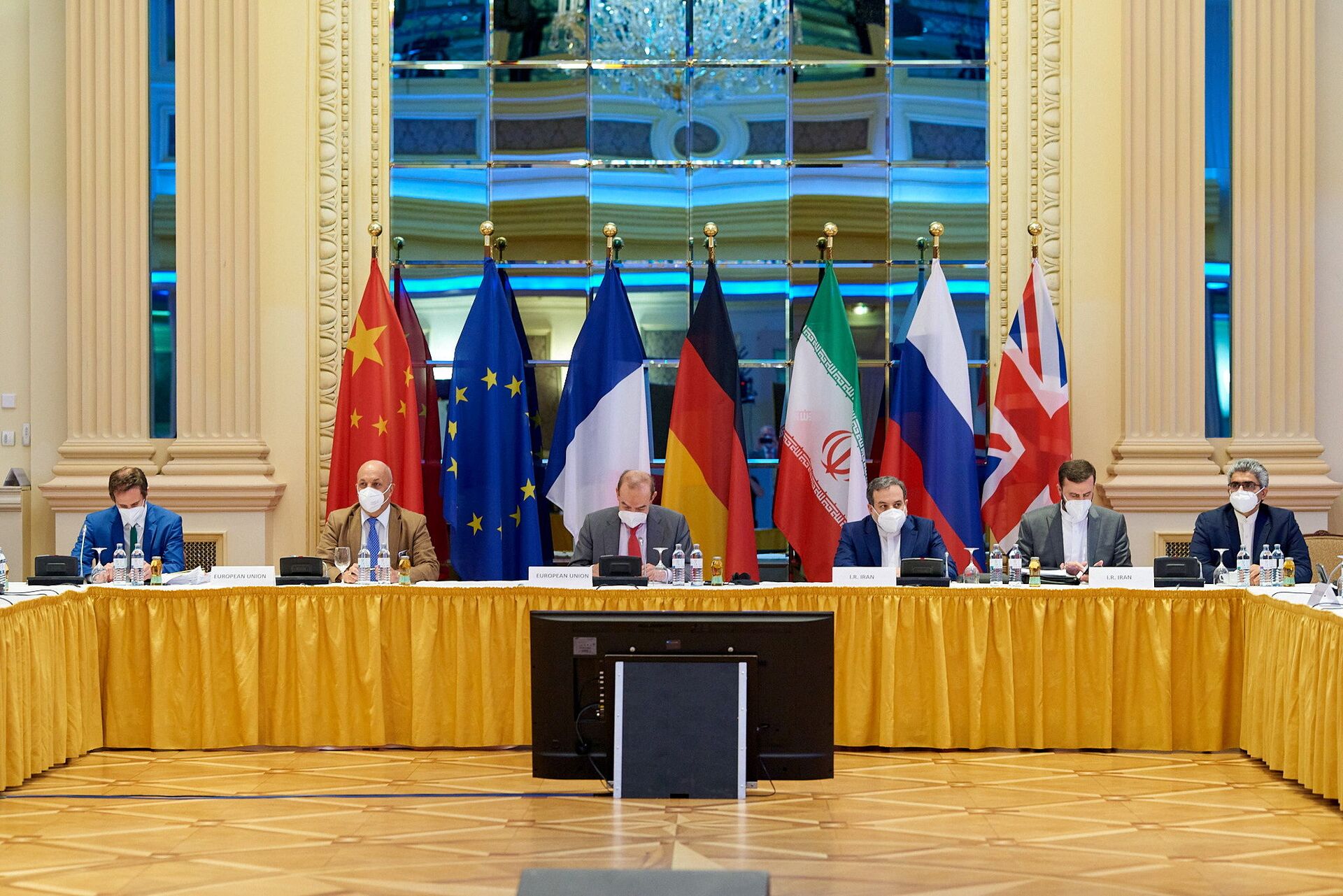https://sputnikglobe.com/20210912/iaea-to-have-no-access-to-irans-surveillance-camera-data-during-grossis-visit---reports-1088999126.html
IAEA to Have No Access to Iran’s Surveillance Camera Data During Grossi’s Visit - Reports
IAEA to Have No Access to Iran’s Surveillance Camera Data During Grossi’s Visit - Reports
Sputnik International
MOSCOW (Sputnik) - During the upcoming visit of the Director General of the International Atomic Energy Agency (IAEA), Rafael Grossi, to Tehran, the IAEA will... 12.09.2021, Sputnik International
2021-09-12T03:35+0000
2021-09-12T03:35+0000
2023-07-31T16:59+0000
iaea
international atomic energy agency (iaea)
iran
iran deal
us-iran relations
iranian nuclear program
iran nuclear deal
https://cdn1.img.sputnikglobe.com/img/07e5/09/0c/1088998990_0:247:3201:2048_1920x0_80_0_0_8d0b091c3b860542cb94bfd4b64fb6c6.jpg
On Saturday, Iranian Ambassador to the IAEA Kazem Gharibabadi announced that Grossi would visit the Iranian capital this weekend and was expected to meet with the leadership of the Atomic Energy Organization of Iran (AEOI) on Sunday.A source told Press TV on Saturday that during the visit, IAEA’s access to cameras will remain off, and the agency will not get to see surveillance footage from Iranian nuclear sites.Grossi is expected to return to Vienna on Monday to report to the IAEA chair of the board. Ahead of the meeting, Russian Foreign Minister Sergey Lavrov discussed the Iran nuclear deal by phone with his Iranian counterpart, Hossein Amirabdollahian, agreeing that restoring the deal in its original balanced configuration is the only correct way to ensure the rights and interests of all parties involved.In 2015, Iran signed the Joint Comprehensive Plan of Action (JCPOA, or the Iran nuclear deal) with the P5+1 group of countries (the United States, China, France, Russia, the United Kingdom - plus Germany) and the European Union. It required Iran to scale back its nuclear program and severely downgrade its uranium reserves in exchange for sanctions relief, including lifting the arms embargo five years after the deal's adoption. In 2018, the Trump administration abandoned the US conciliatory stance on Iran, withdrawing from the JCPOA and implementing hard-line policies against Tehran, prompting Iran to largely abandon its obligations under the accord.US Secretary of State Antony Blinken said on Wednesday that Washington is getting closer to the point when a strict return to compliance with the JCPOA does not reproduce the benefits that the agreement achieved when it was initially signed.
iran
Sputnik International
feedback@sputniknews.com
+74956456601
MIA „Rossiya Segodnya“
2021
Sputnik International
feedback@sputniknews.com
+74956456601
MIA „Rossiya Segodnya“
News
en_EN
Sputnik International
feedback@sputniknews.com
+74956456601
MIA „Rossiya Segodnya“
Sputnik International
feedback@sputniknews.com
+74956456601
MIA „Rossiya Segodnya“
iaea, international atomic energy agency (iaea), iran, iran deal, us-iran relations, iranian nuclear program, iran nuclear deal
iaea, international atomic energy agency (iaea), iran, iran deal, us-iran relations, iranian nuclear program, iran nuclear deal
IAEA to Have No Access to Iran’s Surveillance Camera Data During Grossi’s Visit - Reports
03:35 GMT 12.09.2021 (Updated: 16:59 GMT 31.07.2023) MOSCOW (Sputnik) - During the upcoming visit of the Director General of the International Atomic Energy Agency (IAEA), Rafael Grossi, to Tehran, the IAEA will not have access to data from cameras installed at Iranian nuclear facilities, the Iranian Press TV reports.
On Saturday, Iranian Ambassador to the IAEA Kazem Gharibabadi announced that Grossi would visit the Iranian capital this weekend and was
expected to meet with the leadership of the Atomic Energy Organization of Iran (AEOI) on Sunday.
A source told Press TV on Saturday that during the visit, IAEA’s access to cameras will remain off, and the agency
will not get to see surveillance footage from Iranian nuclear sites.
Grossi is expected to return to Vienna on Monday to report to the IAEA chair of the board. Ahead of the meeting, Russian Foreign Minister Sergey Lavrov discussed the Iran nuclear deal by phone with his Iranian counterpart, Hossein Amirabdollahian, agreeing that restoring the deal in its original balanced configuration is the only correct way to ensure the rights and interests of all parties involved.
In 2015, Iran signed the Joint Comprehensive Plan of Action (JCPOA, or the Iran nuclear deal) with the P5+1 group of countries (the United States, China, France, Russia, the United Kingdom - plus Germany) and the European Union. It required Iran
to scale back its nuclear program and severely downgrade its uranium reserves in exchange for sanctions relief, including lifting the arms embargo five years after the deal's adoption. In 2018, the Trump administration abandoned the US conciliatory stance on Iran, withdrawing from the JCPOA and implementing hard-line policies against Tehran, prompting Iran to largely abandon its obligations under the accord.
US Secretary of State Antony Blinken said on Wednesday that Washington
is getting closer to the point when a strict return to compliance with the JCPOA does not reproduce the benefits that the agreement achieved when it was initially signed.


